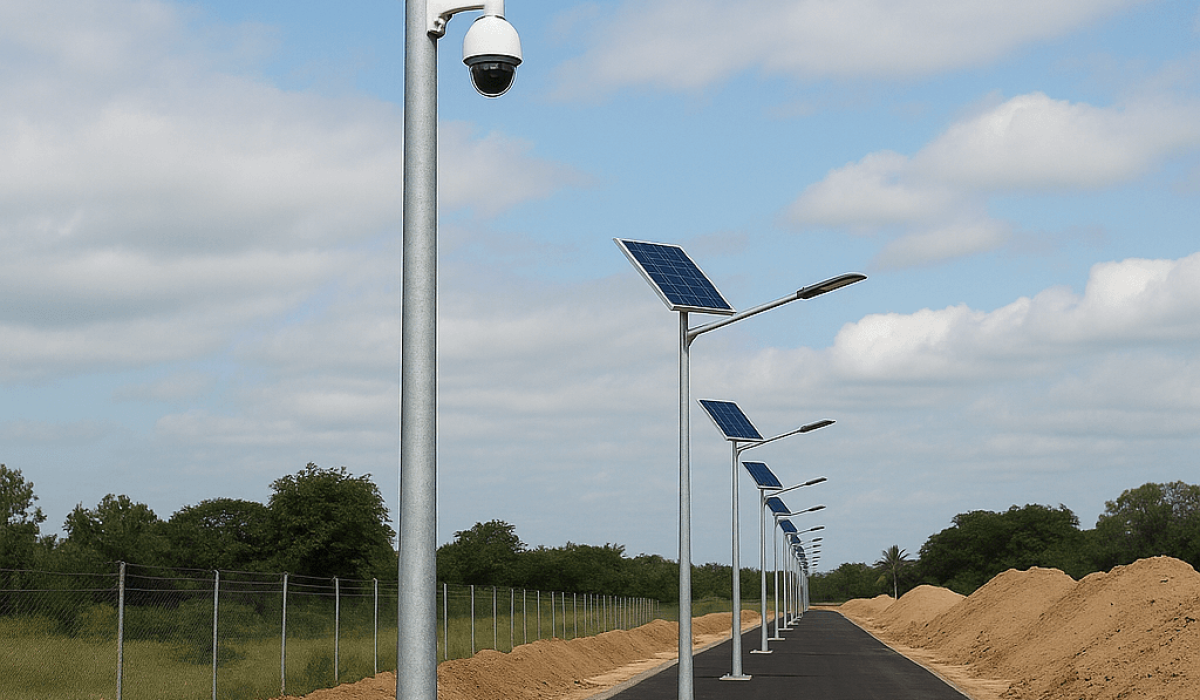Smart street lighting is transforming cities across the Middle East. From reducing energy bills to enhancing public safety, intelligent lighting systems are playing a key role in building smart, connected, and sustainable urban environments.
💡 What Are Smart Street Lights?
Smart street lights are advanced lighting systems that integrate:
- LED luminaires
- Solar or grid power
- Wireless control modules (e.g. Zigbee, LoRa, NB-IoT)
- Sensors (motion, light, temperature, etc.)
- Centralized or cloud-based control platforms
They can automatically adjust brightness, report failures, collect data, and even work with traffic or surveillance systems.
🏙 Why the Middle East Is Embracing Smart Lighting
With rapid urbanization, extreme weather conditions, and national energy diversification goals (e.g. UAE Vision 2030, Saudi Vision 2030), smart street lighting offers the following advantages:
- Minimize power consumption in high-temperature environments
- Enable maintenance-free operation in remote or expansive cities
- Integrate with smart city command centers for real-time control
- Reduce reliance on aging electrical infrastructure
- Enhance public security in both dense and isolated areas
✅ 1. Significant Energy Savings
Smart street lights typically use LED + motion sensing + dimming logic. This reduces energy use by up to 60–80% compared to traditional systems.
| Lighting Mode | Energy Use |
|---|---|
| Full brightness all night | 100% usage |
| Smart motion-dimming | ~30–40% usage |
| Adaptive daylight sensing | ~20–25% usage |
In a hot climate like the Middle East, lower operating time also extends battery and LED lifespan.
✅ 2. Real-Time Monitoring and Fault Alerts
Traditional lighting requires manual inspection.
Smart systems detect:
- Burnt-out LEDs
- Controller failures
- Battery degradation
- Vandalism or tampering
Maintenance teams can receive alerts instantly and plan repairs more efficiently, reducing downtime and improving safety.
✅ 3. Improved Public Safety and Security
Smart lighting systems can:
- Increase brightness when motion is detected
- Integrate with CCTV cameras or emergency alert systems
- Detect unusual activity and send alerts to control centers
- Enable safe lighting levels without wasting energy
In urban neighborhoods, industrial areas, or desert roads, this is vital for crime prevention and emergency response.
✅ 4. Remote Scheduling and Adaptive Brightness
Operators can adjust schedules and brightness by:
- Time of day
- Road occupancy
- Local holidays or events
- Environmental conditions (sandstorms, fog, etc.)
This means greater flexibility and control, with less manual intervention.
✅ 5. Seamless Integration with Smart City Infrastructure
Smart street lighting networks can serve as backbones for:
- Environmental monitoring (air quality, humidity, noise)
- Smart traffic lights
- Parking sensors
- EV charging stations
- Public Wi-Fi zones
This enables cities to scale their smart city platforms without redundant installations.
✅ 6. Lower Maintenance Costs
Smart solar or hybrid systems reduce the need for:
- Frequent bulb replacements
- On-site diagnostics
- Emergency repair calls
In Middle East environments where labor costs and heat damage are major issues, this saves both time and money.
🏗 Typical Applications in Middle East Cities
- 🏙 Urban roads & highways
- 🏘️ Smart residential communities
- 🏢 Industrial & logistics zones
- 🏞 Public parks & waterfronts
- 🕌 Religious and historic districts
- 🛣 Border roads and low-traffic areas
🔎 What to Consider When Deploying Smart Street Lighting
- Controller compatibility (Zigbee, NB-IoT, LoRa)
- Cloud platform vs local server
- Data security and access control
- Sensor accuracy and lifespan
- Integration with existing systems (ERP, GIS, etc.)
Work with reliable suppliers who offer customizable smart lighting solutions based on local regulations and connectivity.
✅ Conclusion
Smart street lights are no longer optional for modern Middle Eastern cities — they’re an essential part of intelligent urban infrastructure.
With benefits ranging from energy savings to public security, municipalities and developers can achieve greener, safer, and smarter cities by upgrading to smart lighting systems.
💡 Looking to deploy smart solar street lights in your next project?
📩 Contact our team for a free smart lighting consultation and system design.
Meta Description
Discover the top benefits of smart street lighting systems for Middle Eastern cities. Learn how intelligent lights save energy, boost security, and enable smart city development.
Frequently Asked Questions
Do smart street lights require internet access?
Not always. Systems using Zigbee or LoRa can operate in mesh mode without internet. For cloud control, NB-IoT or GSM is needed.
Can solar-powered street lights also be smart?
Yes. Many smart systems integrate with solar controllers, enabling wireless control, dimming, and data feedback even off-grid.
Are smart street lights suitable for desert environments?
Definitely. Properly sealed and heat-rated systems perform well even in dusty, high-temperature climates like the UAE or Saudi Arabia.


